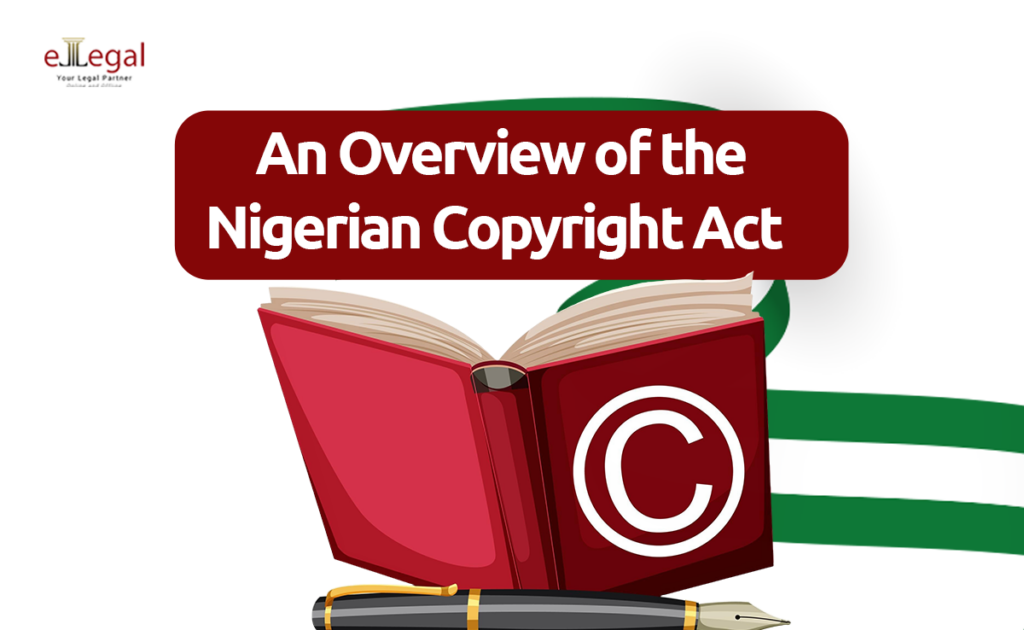The Nigerian Copyright Act has been developed to establish and maintain a robust framework for intellectual property protection, specifically for creative works. Over the years, this Act has undergone significant changes, from its early beginnings to the most recent developments. This Blog explores the key aspects of the Act such as the duration of copyright, enforcement mechanisms, and the processes for obtaining copyright protection.
The New Nigerian Copyright Act of 2022
The Nigerian Copyright Act of 2022 is a fresh update to the country’s copyright laws, keeping pace with today’s digital world. This new law aims to protect creators’ rights more effectively, especially in online spaces, by covering digital rights management and addressing copyright issues specific to the digital environment. The Act not only strengthens penalties for infringement but also clarifies how copyrighted content can be used fairly, allowing limited use without breaking the law. It’s a modern and thoughtful move to support Nigeria’s creative industries in the evolving digital landscape
Key Provisions of the Nigerian Copyright Act
DURATION OF MORAL RIGHTS
Prior to the introduction of the Act, moral rights were considered everlasting and could not be transferred. A common concern among copyright advocates is how to handle works that are in the public domain, especially since the author’s moral rights remain intact. The Act clarifies this issue by confirming that moral rights will cease when the copyright for a work comes to an end. Furthermore, these rights can now be passed on after the author’s death through a will or by legal means.
COPYRIGHTABLE WORKS
The new Nigerian Copyright Act broadens the types of works eligible for copyright, making an important shift from “cinematograph films” to “audiovisual works.” This change expands protection to various forms of media with both sound and visuals, like films, TV programs, web streaming, live broadcasts, and even corporate and church events. It aligns with global standards, similar to provisions in the U.S. and France, where audiovisual works are defined as sequences of moving images, with or without sound.
Importantly, the Act clarifies that a work’s quality or purpose doesn’t impact its copyright eligibility meaning that content from social media creators, regardless of perceived quality, is still eligible for protection. Additionally, anyone compiling existing work doesn’t gain exclusive rights over the original materials. This update makes copyright protection more inclusive for the evolving range of creative expressions in the digital age.
DESIGNATION AS NON-EXCLUSIVE LICENSEES
A noteworthy aspect of the Act is its treatment of commissioned works. It permits those who commission works to limit the publication, exhibition, communication, and distribution of these works, provided there is a written agreement in place. This means that photographs, paintings, drawings, and audiovisual works created for private and domestic use can be considered as non-exclusive licensees. Prior to the Act, a photographer, for example, held exclusive rights to exploit their work unless otherwise agreed upon.
COPYRIGHT BASED ON THE COUNTRY OF ORIGIN.
The Nigerian Copyright Act now simplifies how it determines copyright protection based on a work’s country of origin. Instead of relying on the complex concept of “domicile,” the Act now grants copyright if at least one author is a Nigerian citizen or habitually resides in Nigeria. This shift from domicile to habitual residency makes the rule much clearer and easier to apply, reflecting a practical approach that broadens protection for Nigerian creators.
EXCLUSIVE RIGHTS CONFERED BY COPYRIGHT
Copyright grants exclusive rights to creators of eligible works, allowing them to control how their creations are used or shared. One significant aspect of these rights is the ability to make the work accessible to the public through both wired and wireless means, enabling individuals to access it whenever and wherever they choose. This addition emphasizes the importance of communication to the public, extending the rights of copyright holders to include the ability to publish their works in both traditional and digital formats for everyone to enjoy.
CRIMINAL LIABILITY
This new Act enhances the liability for copyright infringement in a much-needed way. Unlike the Old Act, which had minimal penalties that did little to discourage infringers, this updated provision is praiseworthy. Moreover, the Act expands the definition of copyright offenses. It now includes the right of copyright authors to share their work through wire or wireless channels, making it illegal for anyone other than the author to do so. Additionally, those who help or facilitate another person in committing a copyright violation are also held liable under this Act.
PROTECTION OF DIGITAL CONTENT
The Act’s Part VII takes a big step toward safeguarding copyright in the digital world, addressing the widespread issue of online copyright infringement. It acknowledges the role of digital content, like the kind shared on popular platforms such as TikTok, Instagram, and YouTube, while ensuring creators have the legal support to protect their work. One of the Act’s key measures is a “notice and takedown” system. This allows copyright owners to request that internet service providers (ISPs) remove or disable access to infringing content. If ISPs fail to comply, they may be held accountable, although there are limits to their liability since they lack direct control over user actions. Overall, these provisions are a welcome addition for creators, providing peace of mind that their online content is protected in a fast-evolving digital landscape.
AUTOMATIC COPYRIGHT PROTECTION
According to Section 4 of the Act, copyright protection is granted automatically without the need for any formalities. While this was implied in the previous Act, having it clearly stated is a great addition.
ENHANCED ANTI-PIRACY MEASURES
The Act introduces strong anti-piracy measures to protect copyrighted works. Publishers and anyone reproducing copyrighted material must keep accurate records, with penalties for failing to do so or for falsifying records. One of its key features is support for “technological protection measures,” like encrypted software or access codes, which help secure digital content. It’s now illegal to bypass or import tools that help circumvent these protections. Another safeguard is the recognition of rights management information, making it an offense to alter or remove this information. Right owners are also empowered to take legal action if these protections are bypassed, reinforcing copyright security in the digital space.
THE ROLE OF THE NIGERIAN COPYRIGHT COMMISSION
The Nigerian Copyright Commission (NCC) is the regulatory authority responsible for overseeing copyright laws in Nigeria. It has the mandate to promote copyright protection, investigate cases of infringement, and educate the public on copyright matters. The NCC has been instrumental in enforcing copyright laws and raising awareness about the importance of intellectual property protection.
Under the new Nigerian Copyright Act of 2022, the NCC has expanded authority to work with law enforcement agencies and digital platforms to ensure compliance with copyright regulations. This includes monitoring online spaces for potential infringements, conducting raids to seize pirated materials, and prosecuting offenders. The commission is also involved in dispute resolution, offering mediation services to parties involved in copyright-related conflicts.
Conclusion
The Nigerian Copyright Act has evolved significantly from the 2004 Act to the new Nigerian Copyright Act of 2022. With each amendment, the Act has improved in scope and enforcement, adapting to the changing landscape of intellectual property and digital content. The Nigerian Copyright Act of 2022 is a comprehensive law that not only preserves the rights of creators but also addresses the challenges of the digital age, offering creators and copyright holders greater protection in both traditional and online environments.
If you have questions or need guidance on copyright and trademark matters, eLegal Consultants is here to help. Protecting your intellectual property is essential, and our team is ready to assist you every step of the way. Reach out to us today to safeguard your creations and ensure your rights are upheld. Contact us today.




